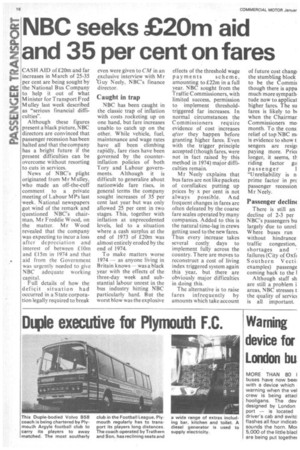NBC seeks £20m aid and 35 per cent on fares
Page 18

If you've noticed an error in this article please click here to report it so we can fix it.
CASH AID of £20m and far increases in March of 25-35 per cent are being sought by the National Bus Company to help it out of what Minister for Transport Fred M ulley last week described as "serious financial difficulties".
Although these figures present a black picture, NBC directors are convinced that passenger recession has been halted and that the company has a bright future if the present difficulties can be overcome without resorting to cuts in services.
News of NBC's plight originated from Mr Mulley, who made an off-the-cuff comment to a private meeting of Labour MPs last week. National newspapers got wind of the remark and questioned NBC's chairman, Mr Freddie Wood, on the matter. Mr Wood revealed that the company was expecting to incur a loss after depreciation and interest of between £10m and £15m in 1974 and that aid from the Government was urgently needed to give NBC adequate working capital.
Full details of how the deficit situation had occurred in a State corporation legally required to break even were given to CM in an exclusive interview with Mr 'Guy Neely, NBC's finance director.
Caught in trap
NBC has been caught in the classic trap of inflation with costs rocketing up on one hand, but fare increases unable, to catch up on the other. While vehicle, fuel, maintenance and wage rates have all been climbing rapidly, fare rises have been governed by the counterinflation policies of both Tory and Labour governments. Although it is difficult to generalize about nationwide fare rises, in general terms the company sought increases of 35 per cent last year but was only allowed 25 per cent in two stages. This, together with inflation at unprecedented levels, led to a situation where a cash surplus at the end of 1973 of £20m was almost entirely eroded by the end of 1974.
To make matters worse 1974 — as anyone living in Britain knows— was a black year with the effects of the three-day week and substantial labour unrest in the bus industry hitting NBC particularly hard. But the worst blow was the explosive effects of the threshold wage
payments scheme, amounting to £22m in a full year. NBC sought from the Traffic Commissioners, with limited success, permission to implement thresholdtriggered far increases. In normal circumstances the Commissioners require evidence of cost increases alter they happen before granting higher fares. Even with the trigger principle accepted (though fares, were not in fact raised by this method in 1974) major difficulties remain.
Mr Neely explains that bus fares are not like packets of cornflakes: putting up prices by x per cent is not always possible. And frequent changes in fares are often defeated by the coarse fare scales operated by many companies. Added to this is the natural time-lag in crews getting used to the new fares. Thus every increase takes several costly days to implement fully across the country. There are moves to reconstruct a cost of living index triggered system again this year, but there are obviously major difficulties in doing this.
The alternative is to raise fares infrequently by amounts which take account
of future cost changi the stumbling block to be the Commis though there is appa much more sympath, tude now to applicat higher fares. The su fares is likely to IN when the Chairmar Commissioners mei month. To the eons relief of top NBC mi is evidence to show t sengers are resigi paying more. Pric( longer, it seems, th riding factor go
passenger 1 "Unreliability is n. prime factor in pr( passenger recession Mr Neely.
Passenger declint
There is still an decline of 2-3 per NBC's passengers bu largely due to unrel. Where buses run without hindrance traffic congestion, shortages and failures (City of Oxf( Southern V ecti. examples) passenge coming back to the 1 Although staff sh are still a problem i areas, NBC stresses t the quality of servict is all important.




































































































